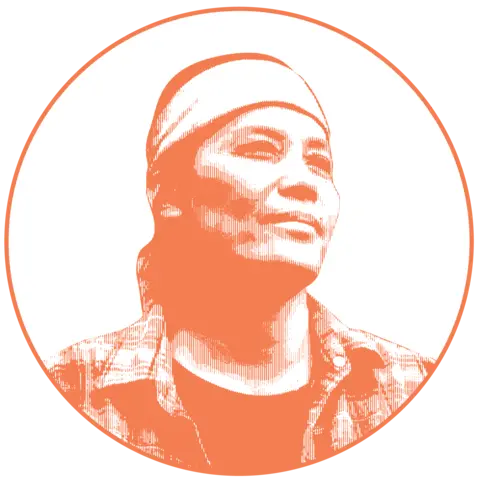
Birds are flying here and there, criss-crossing the skies of Doumanga, a village in Mvouti district in the heart of the Republic of Congo’s mountainous Mayombe forest.
The birds respond to each other across treetops and insects scuttle along branches and up trees. All this happens under the richly perfumed forest canopy where giant trees keep the air moist.
But another sound cuts through the natural hum today. It is the roar of a chainsaw, followed by the crash of trees falling one after another, creaking as if to express their pain.
This is the sound of illegal logging. Since the opening of national road number one in 2011, the sound has become common in the Mayombe forest. From Malele to Les Saras, passing through Pilicondi, Doumanga, and Kisila, illegal logging is in full swing in most villages along the road. Those who cut the trees say they don’t have any choice.

As a nonprofit journalism organization, we depend on your support to fund journalism covering underreported issues around the world. Donate any amount today to become a Pulitzer Center Champion and receive exclusive benefits!
A man from Doumanga who wishes to remain anonymous says: “I am a bricklayer. But opportunities for work are becoming increasingly rare since the onset of the economic crisis in our country. I was forced to move here. I could do something else. But logging gives me something to eat.”
An anonymous charcoal producer from Kisila village adds: “All you need is a chainsaw. You buy a hectare and start cutting down trees. A tree gives you lumber that you can sell for a lot of money. You can make the stumps and branches into charcoal, which is used as fuel in the household. This means that logging is a very lucrative activity.”
Logging is so lucrative, in fact, that it attracts even those who are supposed to earn a good living. Parliamentarians, business leaders, and senior members of the police force are all said to own plots in this forest.
A woman who asked to remain anonymous says, “This area of forest you see here is 50 hectares. It belongs to an army officer. He practices logging, makes charcoal, and farms.”
A man who works closely with the village chief says, “You have not been lied to. Many chiefs have hectares here. Their main activities? Logging, agriculture, and charcoal production.”
The fear of retribution by these authorities is real for villagers. They refused to be named in this story for fear of the consequences.
And yet, logging like this is regulated by the national forestry code, which states that logging here requires a permit, except when cutting wood for domestic uses such as building houses or coffins.
But, as a resident of Pilicondi explains, loggers do not respect this law and bribe local water and forestry officials, especially loggers who work for the authorities.
According to Fabrice Séverin Kimpoutou, a research assistant at an organization called Meeting for Peace and Human Rights, such corruption is commonplace.
Mr. Kimpoutou says, “During our discussions with them, local communities report corruption and influence peddling.”
As part of a program to educate local people on forest and land governance, an organization called Meeting for Peace and Human Rights is conducting investigations into illegal logging in Kouilou, the department in which the Mayombe forest is located.
But reports of illegal logging are difficult to verify and authorities find it similarly difficult to intervene.
An agent of the Water and Forests Service asks, “How do you expect us to stop a colonel’s convoy of saws? That would be asking for trouble.” He too spoke on condition of anonymity.
The Mayombe forest is an important component of the Congo Basin, one of the world’s main ecological lungs. But the forest is gradually degrading. Certain areas have actually disappeared, and been replaced by man-made savannahs. This is the case in the village of Ntoto Siala, where a banana plantation stretches as far as the eye can see.
Villagers say they are aware of the danger this poses. Jean Marie Mambou is a former chief of Doumanga. He says: “Our parents fed us and raised us, thanks to this forest. But since this road was opened, logging has increased. And every day there are new faces. At this rate, there is reason to fear for our future.”
Loggers say they are equally concerned. As one logger from Doumanga says, “I am aware that we will not see [the forest] anymore. It is disappearing. But we have no choice. We really need alternatives.”
Others, such as farmers in Mayombe, have already found alternatives. Jean Banzenza is a beekeeper not far from Doumanga. He says, “I do beekeeping. For me, this is the best way to benefit from Mayombe without endangering it.”







